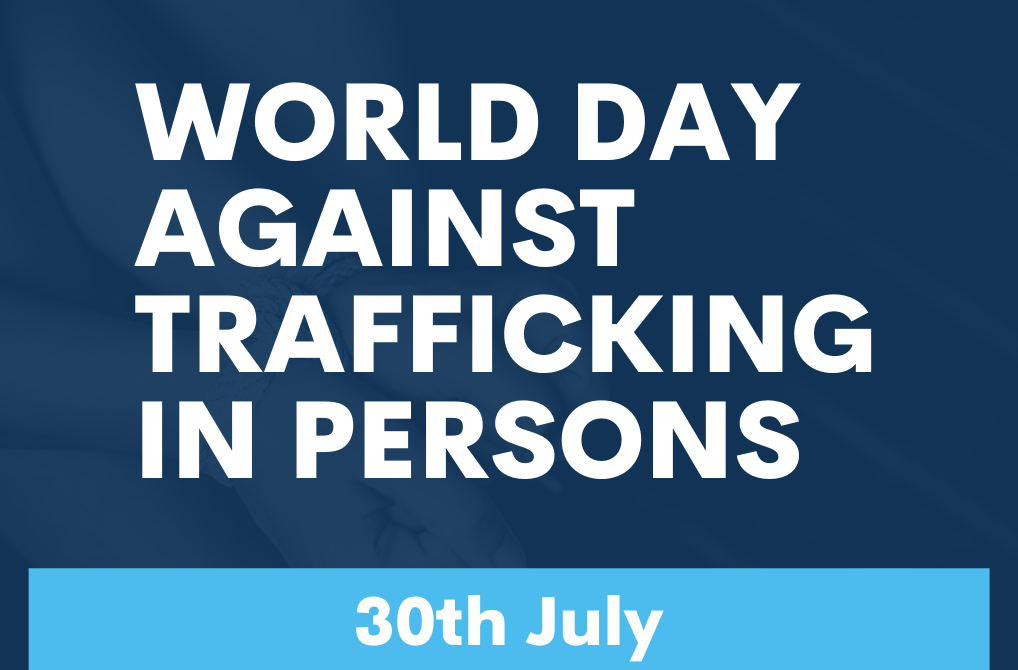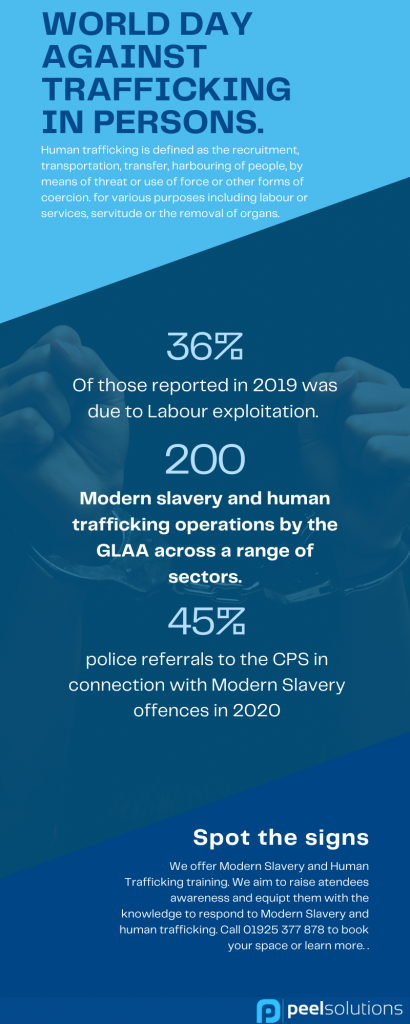Today is World Day Against Trafficking in Persons.
Trafficking in persons is a serious crime. Every year, thousands of men, women, and children fall victim to traffickers, in their own countries and abroad.
What Is Human Trafficking?
Human trafficking is defined as the recruitment, transportation, transfer, harbouring of people. By means of threat or use of force or other forms of coercion. for various purposes including labour or services, servitude or the removal of organs. It is to be one of the largest criminal industries in the world, second only to drug trafficking.
Human Trafficking facts & statistics
• UK was the first country to order businesses to produce an annual modern slavery statement.
• The majority of potential victims reported via the duty to notify in 2019 were from non-EEA countries (61%; 1,387), whereas 29% (659) came from EEA countries and 8% (176) from the UK.
• In 2019 Labour exploitation was most reported (36%; 828) followed by sexual exploitation (22%; 505).
• Just over a third (790) were referred by UK Visas and Immigration, whilst 12% (275) were referred by Border Force.
• in 2020, police investigations increased 83%, police referrals of victims into the NRM increased 32% and police referrals to the CPS in connection with Modern Slavery offences increased 45%.
• On 26 March 2020, the UK became the first country in the world to publish a Modern Slavery [supply chain] Statement outlining the steps it has taken to drive responsible practices and prevent risks of modern slavery in Government supply chains.
• In 2019/20, the GLAA conducted over 200 Modern slavery and human trafficking operations across a range of sectors.
• The Home Office Invested an additional £2 million to continue to support the law enforcement activity this year (2020/21) under the new Modern Slavery and Organised Immigration Crime Programme.
Source: (Gov.uk)
Effects of Human Trafficking
Like many criminal gangs, Human Traffickers target those who are the most vulnerable. Some of their victims could be:
• Unemployed
• Alcohol/drug dependent
• Homeless
• Have mental health problems
• Poverty
The physical and psychological abuse that the victims may receive during being trafficked can lead to long term mental health issues. This includes (but not limited to) : substance abuse, eating disorders, anxiety, depression etc.
The victims are often isolated from their families for many reasons. They could be forced not to speak to them, feel guilt/shame about work they’re carrying out or are relocated. This could lead to social and emotional difficulties on their return.
They may lack the ability to live alone and struggle to do tasks that we may class as basic.
If trafficked at a young age they may have missed out on school or college and not have the education that many do have.
What can we do to stop human trafficking?
The main thing that we can do is spot the signs and speak up if we see anything suspicious. Many criminal activities happen under our nose in plain sight. We need to speak out against suspicious activities.
If you suspect human trafficking, call the police. Call 999 if it’s an emergency, or 101 if it’s not urgent. If you’d prefer to stay anonymous, call Crime stoppers on 0800 555 111.
At peel solutions, we offer Modern Slavery and Human Trafficking training. We provide attendees with a thorough understanding of the issues. We aim to raise atendees awareness and equipt them with the knowledge to respond to Modern Slavery and human trafficking. Call 01925 377 878 to book your space or learn more about our training courses here.



